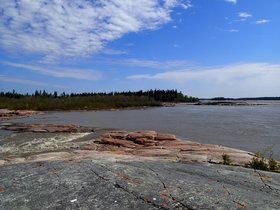Smith's Landing, Northwest Territories

Year(s) Funded: 2015-2016
Topic Area: Adaptation Planning, Vulnerability Assessment Contact: Cochise Paulette, Smith’s Landing First Nation (lands@[email protected]) Partners: Smith’s Landing First Nation, Aurura Research Institute of Aurora College Website: https://www.slfn196.com Title: Cassette Islands Vulnerability Assessment
Action: The Tthëbayághe Nué Bekahuneka (Cassette Islands Climate Change Project) was developed to bring local knowledge and indigenous science together with western science to explore the impacts of a changing climate on our health and traditional food security. Connecting SLFN youth with Elders out on the land was an important goal. The project largely took place on the land, with a focus on the Cassette Islands in the Slave River, an area that was traditionally used for food harvesting for thousands of years. A base camp was set up on one of the Islands, and two camps were carried out over the course of the summer, including a 3-day camp in June and a 4-day camp in July. During the camps and day trips, observations and oral histories were documented using videos and photos to explore the extent of local climate change impacts. Some western science indicators were also collected. Results:The primary benefit this project was that it provided supported the development of traditional land-based skills for youth, while offering additional training and tools to monitor Smith’s Landing First Nation territory. Engaging youth in environmental monitoring that is grounded in their own cultural practices is beneficial to the community at large by utilizing local traditional knowledge resources to empower the next generation of land-users and caretakers. The integration of traditional knowledge with western science and digital data collection technology helped bridge the gap between older and younger generations in the community. The results of this project have also re-emphasized the importance of continuing to build these skills with youth so they have a strong foundation for adapting to the changes that will come. Outputs: An assessment of local climate change impacts and community vulnerabilities and a monitoring plan were developed. |
